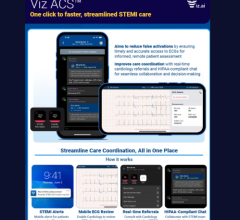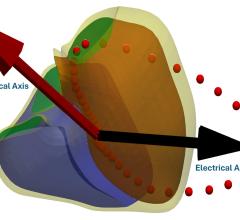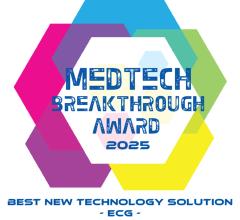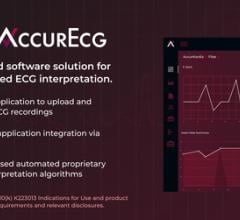May 21, 2007 — Findings presented last week during the annual meeting of the Heart Rhythm Society in Denver indicate a common stress test, using GE Healthcare’s latest algorithm for the measurement of T-wave Alternans (TWA), can be useful in predicting sudden cardiac death, even in those without a previous heart attack or symptoms of heart failure.
As part of the Finnish Cardiovascular Study (FINCAVAS), Dr. Tuomo Niemenen, Tampere, Finland, and a team of researchers used more than 1,000 consecutive patients who had been prescribed an Electrocardiogram (ECG) clinical exercise test. The research team found that T-Wave Alternans (TWA) measurements in the ECG are strong predictors of mortality, particularly of sudden cardiac death, in a normally low risk population. Sudden Cardiac Death (SCD) kills half of all heart disease patients, which is, in itself, America’s leading cause of disease-related death.
“The accuracy and usefulness of exercise-induced TWA in predicting arrhythmic events and deaths have been investigated in several studies with relatively small number(s) of participants,” said Niemenen of this novel approach. “Until now, the prognostic significance of TWA in more general populations (had) remained undetermined.”
The exercise test, performed using a bicycle, was measured using GE’s Marquette TWA Algorithm. Compared to other equipment that measures T-wave Alternans during a stress test, no special electrodes were required when using GE Healthcare’s CardioSoft exercise ECG system to measure the small alternating signals that reveal cardiac electrical instability.
“These observations raise the possibility that the clinical application of TWA analysis may be useful for a more general population of patients without congestive heart failure and/or depressed left ventricular function,” Niemenen added.
MUNICH STUDY FURTHER VALIDATES GE HEALTHCARE TECHNOLOGY’S ABILITY TO PREDICT SUDDEN CARDIAC DEATH
Last week a German scientist added his conclusion to the mounting evidence heralding an element of GE Healthcare technology as a strong predictor of risk of death after heart attack.
Presenting at the Heart Rhythm Society meeting, Dr. Georg Schmidt, Munich University of Technology, Germany, concluded Heart Rate Turbulence (HRT) to be a good predictor of death among heart attack survivors, especially when combined with Schmidt’s patented Deceleration Capacity (DC) value. This combined value also identified patients in the presence of preserved left ventricular function, who would have been overlooked by today’s generally accepted risk prediction standard, left ventricular ejection fraction (LVEF).
GE Healthcare’s 24 hour MARS Holter system with GE’s Marquette HRT Algorithm is the only FDA cleared device capable of measuring HRT on today’s market.
Schmidt’s study sampled 2,376 heart attack survivors under age 76 and used 24 hour Holter records to determine their HRT and DC values. Of this group, 185 subjects died during the 5-year follow-up period, more than 43% of which had been designated “high risk” during the study to have a repeat incident.
“We reached this conclusion by carefully determining the level we’d consider ‘high risk,’” said Dr. Schmidt. “It was the combination of HRT and DC measurements that allowed us to establish this tier and accurately determine which patients fell above or below the line.”
STUDY FINDS SINGLE, SIMPLE TEST COULD SAVE LIVES, MONEY THROUGH MORE ACCURATE RISK DETECTION
More than 90 percent of automatic implantable defibrillators never have to do what they’re intended to do — that is, they never have to restart the heart. For decades, while clinicians and analysts debated, researchers have tried to sharpen the risk assessment tools used to determine which patients need the potentially life-saving implant. It now may have been found in a single tool that may decrease the amount of unnecessary implants by as much as half.
Results of the promising REFINE (Risk Estimation Following Infarction, Non-invasive Evaluation) study revealed a single 24-Hour Holter test, capable of measuring abnormalities in two key categories, a strong predictor of Sudden Cardiac Death (SCD).
“(SCD) is a huge problem worldwide. Three million people a year will die from it,” said lead REFINE researcher and University of Calgary Cardiologist Derek Exner. “We have had some markers that are fairly crude for identifying who’s at risk but we’ve only identified 5 percent of those who have sudden death. This is a huge public health problem where we haven’t had the techniques to identify those at risk.”
Dr. Exner’s study sought to find the optimal available non-invasive method for determining who is at risk for SCD, or Cardiac Arrest, which kills half of all heart disease patients. To do so, REFINE compared all available non-invasive assessment methods and found of those studied the most predictive method to be the combination of moderately impaired Heart Rate Turbulence (HRT) and an abnormal T-Wave Alternans (TWA) level.
This combination, when used 10-14 weeks after each subject’s heart attack, predicted a four-fold higher risk level in patients with the abnormal markers compared those without. After four years of follow-up on the 320 subjects studied, researchers confirmed the relative accuracy of these predictions. These Holter-based measurements are currently available exclusively through the use of GE Healthcare’s MARS Holter system using GE’s Marquette Algorithms for HRT and TWA. Several trials are already planned for the study’s next step, prospective validation.
“If (validation happens), it would allow GE to provide a validating risk assessment tool that no one else currently has,” said Dr. Exner. “It would be a huge advancement.”
The Alberta Heritage Foundation, the Canadian Institutes of Health Research and the Heart and Stroke Foundation of Alberta provided support for the research. GE Healthcare was one of two vendors providing unrestricted donations of equipment and testing materials. The vendors were not involved in the study’s design or conduct, data collection, data analysis, or interpretation of the data.

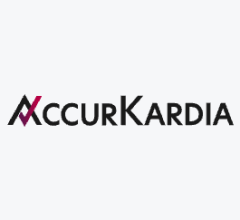
 January 15, 2026
January 15, 2026 


